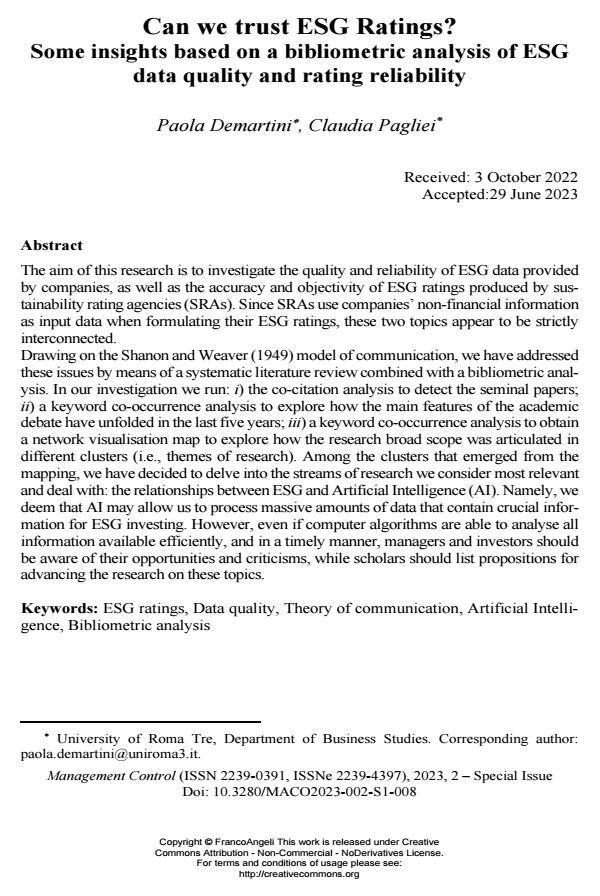Can we trust ESG Ratings? Some insights based on a bibliometric analysis of ESG data quality and rating reliability
Titolo Rivista MANAGEMENT CONTROL
Autori/Curatori Paola Demartini, Claudia Pagliei
Anno di pubblicazione 2023 Fascicolo 2023/2 Suppl.
Lingua Inglese Numero pagine 27 P. 161-187 Dimensione file 341 KB
DOI 10.3280/MACO2023-002-S1008
Il DOI è il codice a barre della proprietà intellettuale: per saperne di più
clicca qui

FrancoAngeli è membro della Publishers International Linking Association, Inc (PILA), associazione indipendente e non profit per facilitare (attraverso i servizi tecnologici implementati da CrossRef.org) l’accesso degli studiosi ai contenuti digitali nelle pubblicazioni professionali e scientifiche.
The aim of this research is to investigate the quality and reliability of ESG data provided by companies, as well as the accuracy and objectivity of ESG ratings produced by sustainability rating agencies (SRAs). Since SRAs use companies’ non-financial information as input data when formulating their ESG ratings, these two topics appear to be strictly interconnected. Drawing on the Shanon and Weaver (1949) model of communication, we have addressed these issues by means of a systematic literature review combined with a bibliometric analysis. In our investigation we run: i) the co-citation analysis to de-tect the seminal papers; ii) a keyword co-occurrence analysis to explore how the main features of the academic debate have unfolded in the last five years; iii) a keyword co-occurrence analysis to obtain a network visualisation map to explore how the research broad scope was articulated in different clusters (i.e., themes of research). Among the clusters that emerged from the mapping, we have decided to delve into the streams of research we consider most relevant and deal with: the re-lationships between ESG and Artificial Intelligence (AI). Namely, we deem that AI may allow us to process massive amounts of data that contain crucial information for ESG investing. However, even if computer algorithms are able to analyse all information available efficiently, and in a timely manner, managers and investors should be aware of their opportunities and criticisms, while scholars should list propositions for advancing the research on these topics.
Parole chiave:ESG ratings, Data quality, Theory of communication, Artificial Intelli-gence, Bibliometric analysis
Paola Demartini, Claudia Pagliei, Can we trust ESG Ratings? Some insights based on a bibliometric analysis of ESG data quality and rating reliability in "MANAGEMENT CONTROL" 2 Suppl./2023, pp 161-187, DOI: 10.3280/MACO2023-002-S1008